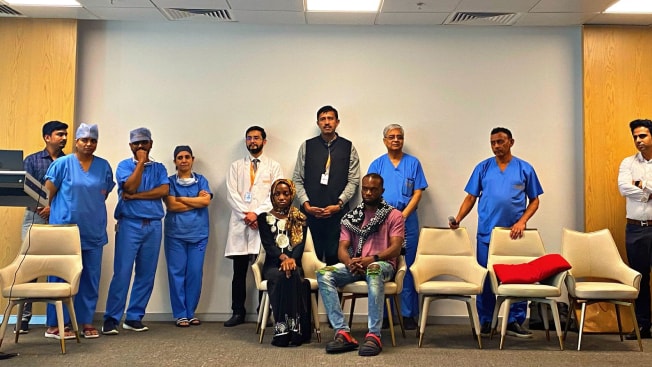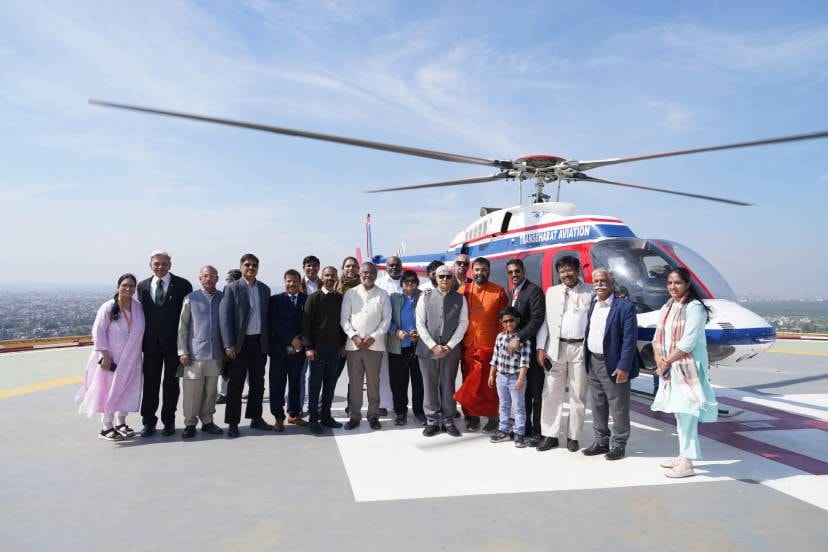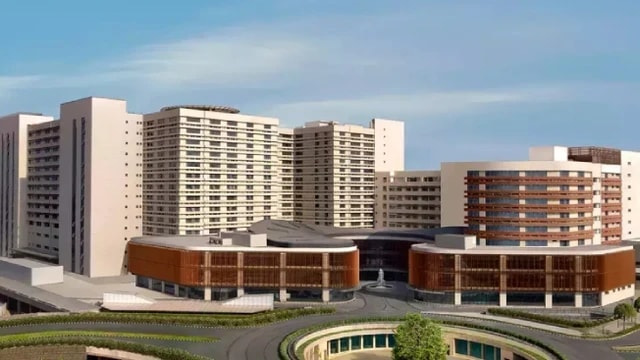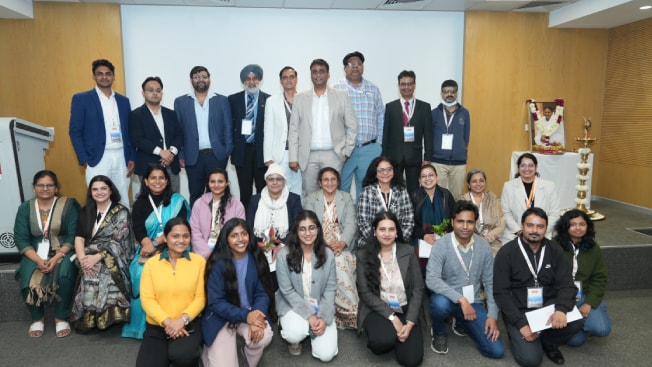
In an intricate, first-of-its-kind case in North India, a 27-year-old woman from Nigeria who developed an enormous neck tumor the size of a musk melon, was successfully operated upon by a team of specialists at Amrita Hospital, Faridabad. The tumor, which obstructed the patient’s ability to breathe, speak, and swallow, was removed in an 11-hour surgery, giving enormous relief to the patient who came to Amrita Hospital after unsuccessful attempts at surgery at other hospitals.
The patient was suffering from a rare genetic disorder called plexiform neurofibromas which is characterized by the development of tumors along the nerves in various parts of the body. These tumors, known as neurofibromas, can occur on or under the skin, as well as inside the body. Though benign, they are at significant risk of turning malignant if left untreated.
The occurrence of this condition in the neck is rare, and tumors of this nature usually grow to a size of only 5-6 cm. The woman’s tumor, however, was a whopping 16 cm in size. She was experiencing significant physical, social, and emotional challenges. She had difficulties in breathing and swallowing, as well as limited mobility in her neck. She struggled immensely to walk, and the simplest daily tasks seemed like insurmountable obstacles to her.
The patient, who was dealing with the huge mass on her neck since 2019, had already undergone two unsuccessful surgical attempts in her own country. The tumor, steadily growing in size, had begun to compress her windpipe, necessitating the insertion of a breathing tube into her throat. As a result, she was unable to speak. Subsequently, the woman decided to visit Amrita Hospital in Faridabad after learning about the hospital through the Internet.
Dr. Subramania Iyer, HOD, Head & Neck Surgery, Amrita Hospital, Faridabad , said, "The patient came to us with a massive neck tumor that was severely impacting her health. She was diagnosed with neurofibromatosis type 1, a rare disorder that occurs in approximately 1 in 4,000 live births. It is uncommon to find this kind of tumor of such significant dimensions. Its growth pattern was also unusual, as it extended behind the food pipe, creating a separation from the spine and crossing from one side of the neck to the other. It was not only pressing on the food pipe, making eating progressively more challenging and limiting the patient to a liquid diet, it was also encroaching upon the critical blood vessel supplying the left side of her brain and beginning to affect the right side as well. Additionally, the tumor had invaded and damaged several vertebrae, rendering her spinal column unstable and posing an immediate risk of paralysis. The surgery performed in this case was highly challenging and required a multidisciplinary team approach to optimize the outcomes."
The surgery involved removing the tumor from the neck and spine and stabilizing the spine. The use of special techniques to monitor the nerves and the involvement of different medical specialties ensured that important structures were protected during the surgery.
Dr. Subramania Iyer said, "The surgery was done in stages to completely remove the tumor and ensure the safety of important structures. The tumor had squeezed and blocked the food and windpipe, was very close to the blood vessels that supply the brain, and near the major nerves that control the face and neck. Our team of interventional radiologists performed a crucial brain circulation test to determine if sacrificing blood vessels would be hazardous if it became necessary. Our neurosurgery team successfully addressed the tumor in the spine and ensured spine stabilization. The initial stage focused on the removal of the neck tumor, utilizing cutting-edge neural monitoring techniques guided by a neurophysiologist to safeguard the spine from any potential injury. Both the carotid arteries were preserved during the procedure."
"The progress we've witnessed in the patient's recovery is truly remarkable. She has transitioned to oral feeding, needing minimal to no assistance from the feeding tube. While she still relies on the breathing tube inserted during her time in Nigeria, we are optimistic about removing it within the next few weeks. Once the breathing tube is removed, she will regain her ability to speak and resume a normal life," said Dr. Iyer.
Said the patient, "I had lost all hope after undergoing two unsuccessful surgeries in Nigeria, and the tumor kept growing. I am extremely relieved and happy with the outcome of the procedure, as I now resemble my former self once again. I eagerly anticipate resuming a normal life. I extend my heartfelt gratitude to the doctors at Amrita Hospital for their unwavering efforts in undertaking and accomplishing this very challenging surgery successfully and saving my life."
The surgery was performed by a team which included Dr. Subramania Iyer, Dr. Anandh Balasubramanian, Dr. Tejal Patel, Dr. Neha Suri, Dr. Pradeep Sharma, Dr. Mukul Chandra Kapoor, Dr. J.S Rahul along with supportive expertise from Dr. Sanjay Pandey, Dr. Puneet Dhar, Dr. Neha Chaudhary, Dr. Heena Parihar and Mr Kaustubh Talukdar.


